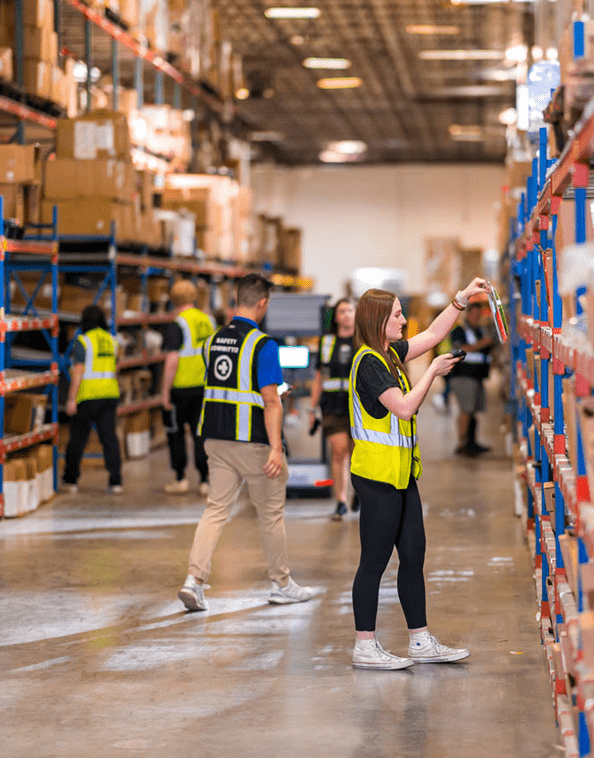Contract logistics plays a critical role in modern supply chain management, offering businesses the ability to outsource specific logistics functions to specialized providers. For companies looking to expand fulfillment capabilities without the expense and complexity of managing everything in-house, contract logistics offers a streamlined, scalable solution. In this guide, we’ll cover what contract logistics is, how it works, how it differs from third-party logistics (3PL) services, and how to determine which option best suits your business.
What is Contract Logistics?
Contract logistics is the strategic outsourcing of certain supply chain functions—such as transportation planning, freight coordination, and delivery management—to external specialists. These arrangements are typically long-term, allowing the provider to act as an extension of your operations.
The aim is to reduce logistics costs, improve operational efficiency, and enable growth without requiring the business to manage every step of the process internally. Contract logistics providers often work directly with carriers, freight partners, and other logistics service providers to ensure goods move efficiently from one point to another.
How Contract Logistics Works
A contract logistics provider takes on the responsibility of coordinating transportation and delivery. This can involve negotiating lower shipping rates through volume discounts, determining the most efficient shipping routes, and minimizing delays in transit.
The provider may manage freight between manufacturers, distribution centers, and fulfillment facilities. While they do not usually handle warehousing or order fulfillment themselves, they ensure inventory gets to the right place at the right time—critical for businesses that operate across multiple locations or serve customers in different regions.
Contract Logistics vs. 3PL Services
The terms “contract logistics” and “3PL” are sometimes used interchangeably, but they refer to different scopes of service.
Contract logistics typically focuses on transportation, delivery management, and route optimization. These providers often specialize in getting bulk shipments from one facility to another but may not manage inventory, store products, or fulfill orders directly.
A third-party logistics provider, on the other hand, offers a more comprehensive service. In addition to transportation, a 3PL manages warehousing, inventory, order fulfillment, and technology integrations that connect to ecommerce platforms and marketplaces. Many 3PLs operate multiple fulfillment centers, enabling faster shipping times and lower costs for businesses.
In some cases, a business might use both—a contract logistics provider to manage inbound freight from manufacturers, and a 3PL to handle outbound fulfillment to customers.
Key Advantages of Contract Logistics
1. Cost Savings
Contract logistics providers leverage their shipping volumes to secure better carrier rates. Businesses can take advantage of these savings without committing to large transportation contracts on their own.
2. Efficiency
By using advanced planning and coordination, providers can identify optimal shipping routes and reduce transit delays. This ensures goods arrive on time and in the most cost-effective way possible.
3. Scalability
As your business grows, a contract logistics provider can adjust resources and carrier relationships to match your needs, without requiring additional investments in infrastructure or staff.
4. Expertise
These providers bring specialized industry knowledge, allowing you to navigate complex shipping requirements, customs regulations, and multi-carrier coordination with ease.
When to Choose Contract Logistics
Contract logistics may be the best choice if you:
Need help managing freight and transportation but want to keep fulfillment in-house.
Already have warehouse space, staff, and order fulfillment processes in place.
Are looking for a long-term partner to optimize shipping routes and costs.
Operate internationally and need a provider to handle carrier negotiations and compliance.
When to Choose a 3PL Instead
A 3PL is often the right fit if you:
Want to outsource both warehousing and fulfillment along with transportation.
Lack the infrastructure to store and ship products yourself.
Need access to advanced inventory tracking, order management, and real-time shipment visibility.
Require multiple fulfillment centers to speed up delivery times and reduce costs.
Choosing the Right Logistics Partner
Whether you’re considering contract logistics or a 3PL, the decision should be based on your operational needs, budget, and growth goals. Key factors to evaluate include:
Services Offered: Make sure the provider’s capabilities align with your requirements.
Technology: Look for real-time tracking, analytics, and integration with your existing systems.
Scalability: Ensure they can support both seasonal fluctuations and long-term growth.
Geographic Coverage: A strong network can significantly reduce shipping times and costs.
Final Thoughts
Contract logistics can be a highly effective way to expand your fulfillment capabilities without taking on the full burden of logistics management in-house. By understanding how it differs from 3PL services, you can choose the model that best supports your supply chain strategy. Whether you opt for a specialized contract logistics provider or a comprehensive 3PL, the right partner can help you cut costs, improve delivery speed, and enhance the customer experience—while giving you more time to focus on growing your business.
See how FulfillMe can support your fulfillment needs and help you scale smarter.

Don Cummings is a seasoned logistics and fulfillment executive, serving as Vice President of Sales and Marketing at FulfillMe. He brings a proven track record of building high-performing national sales teams and implementing sales enablement strategies that align commercial objectives across sales and marketing functions. With early career experience at the United States Postal Service and Stamps.com, Don combines deep operational insight with strategic leadership to drive scalable growth solutions in the 3PL and e-commerce sectors.







